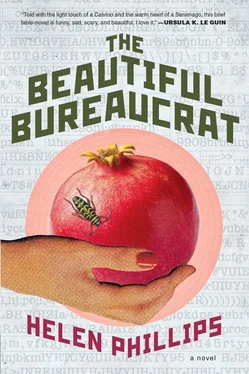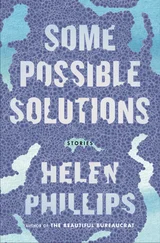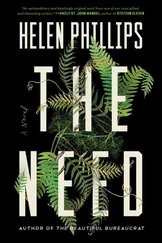She nodded as though she hadn’t spent all day creeping around the apartment.
The stranger to whom the garden apartment belonged would return over the weekend, and Joseph had found a third sublet for them — a place that promised to be better than this one, a little bit more per week now that they were doing a little bit okay financially, one neighborhood over and slightly farther from downtown, but still on their train line. He alleged that they had discussed all this quite recently, though she could retrieve no such memory from her blurred brain.
“Where’s the duffel?” he said, heading down the dim hallway toward the bedroom.
* * *
Theowner of the third sublet had described it to Joseph as being “beside the bridge”; when the taxi dumped them and their stuff on the sidewalk, they discovered that the bridge was really an entrance ramp onto the highway.
A new stranger’s door, a new poorly lit hallway, a new set of keys with which to fumble. Inside, they found a room filled with plants, fifty or more plants, ranging from a cactus to a miniature orange tree; plants in pots, plants suspended from the ceiling. The air was damp, sulfuric.
Joseph plopped down on a stained couch lodged among the plants. A hanging fern dangled above his head like a spiky green hat.
“Do I look pretty?” he said.
At other times in their life she would have laughed. He tried to open the window to let in some air, but it jammed after just an inch.
She turned on the hall light, which burned fiercely for a few seconds before popping into darkness. In the dark, they couldn’t locate any spare bulbs.
“What did we do to deserve this?” she said.
“We broke someone’s heirloom plate,” he said.
She looked over at him, but it was too dark to tell whether he was being funny or serious.
Late in the night — after they’d bought lightbulbs at a bodega, after he’d managed to say something that forced her to smile, after they’d found a pizza place (“hint of hinterland,” he observed when the pie arrived thick-crusted) — he held her tightly.
She was feeling kinder, despite the poisonous fragrance of the plants; she was about to murmur “041-74-3400” like a term of endearment.
“Don’t be a stone,” he said. “You can’t be a stone anymore.”
Tone y tore.
Only ore.
She pulled away from him, confused, offended.
* * *
Itwas a rainy weekend. She appreciated the appropriateness of the weather. They slipped into a kind of mute peace. She kept her mind bland, hardly thought about her office, the gray files piling up toward the ceiling.
On Sunday night, they went for a walk. The rain had given way to a light mist. They were passing a Catholic church and convent with a FOR LEASE sign when it began to pour again. As they grappled with their shared umbrella, she sensed another couple walking annoyingly close behind them, their shadows overlapping with hers and Joseph’s. That couple was also struggling to make an umbrella cover two.
In the churchyard, a spotlight glared up at a marble statue of Mary. Above the statue, a single rain-battered tree scattered leaves as fragile as discarded tissues. Beyond the leaves, red stained-glass windows gleamed dully. Josephine imagined nuns with candles, gliding insomniacs, terribly beautiful, terribly silent, pretending the FOR LEASE sign didn’t exist.
Glancing behind, she realized that the couple following too near to them was in fact them — an illusion born of the conflicting shadows cast by the streetlights. She looked down at the sidewalk and tried to parse the disorderly shadows, but she got distracted by something: shining slimy in the streetlight, a proliferation of drowned worms, enough worms to make one’s gut tremble.
She decided not to mention the worms. She didn’t want him to have to know about all the worms they couldn’t help but step on, all the remnants in the treads of their shoes.

On Monday morning, Josephine got dressed for work. She stood in the bathroom with Joseph. There was a row of plants on the rim of the bathtub, bamboo and other things. As they brushed their teeth they made bug-eyed faces at each other in the mirror. She was absorbed enough in the face-making that it was a moment before she noticed the pitiful state of her eyes, her skin. She spat.
She was dressed for work. It seemed that she was going to go to work. It seemed that she was going to sit down at her desk, enter her password into the Database, reach for a file from the hill of files.
But she lingered as he put on his coat.
“You coming?” he said.
“I need a few more minutes,” she said. “Go ahead without me.”
He hugged her, but breezily, and was gone. She stood, unmoving. She was going to go to work. She ran to the door, about to yell for him — wait for me, I’m ready. But something caught her eye when she opened the door: THIRD DELIVERY ATTEMPT FAILED.
Tempt paled.
Lent ailed.
She yanked the postal notice off the door, ripped it in half, separating the JOSEPHINE from the NEWBURY. No one knew this latest address.
* * *
Walkingin the park, Josephine tried to imitate a happy person, a satisfied, relaxed, competent person strolling in a park, but she kept having the sensation of people staring at her. A small girl with a soccer ball. A skinny woman whose black pit bull strained against its leash. The frightening old men who dared fish in the city pond. All staring at her, or so it seemed, with brazen judgment, as though they knew she was not where she was supposed to be. As though someone had instructed them to keep an eye on her.
Because the Database had abused her eyes, the swans looked to her like big white irascible blurs. A baby sitting on the grass in a red coat was actually a fire hydrant; a spaniel’s face was actually a spaniel’s behind.
She feared the pit bull chasing its squeaky toy that shrieked like a human when trapped between canine jaws.
A group of schoolchildren swarmed the paved path; their exhausted teacher pointed them toward the exit. “But we didn’t even get the chance to get lost!” a girl protested.
Josephine fled the paved path for a dirt trail leading toward the innards of the park. She passed trees tagged with graffiti. Discarded soda cans, used condoms, dirty napkins, ragged spiderwebs, squirrels more anxious than usual.
She almost stepped on a matted mash of twigs and feathers twisted at bizarre angles, an appalling object, difficult to look at. Only a sicko would gape, attempt to sort it out, weigh in on one side or the other — a fallen nest or the aftermath of a death?
She came to yellow police tape boxing in the area between three trees, but the space was empty. No blood, no sign of anything.
She hadn’t even brought her phone.
She stood eyeing the police tape until a father carrying his young daughter on his shoulders strolled past. “I can’t even tell what you’re pointing at,” he was saying to her, almost scornfully. “Are you pointing at the trees? What, you want us to go and live in these woods and be savages?”
Josephine hurried away from the police tape, emerged out of the woods onto a lawn covered in grazing geese. The geese began to stride in her direction, hissing.
She escaped onto a path lined with cattails.
Scat tit.
At ails.
A row of dead cats all hung up by their tails.
A man and woman in business attire passed in front of her, talking loudly and walking quickly. The man was saying, “and we’ll live by a lake. We’ll have a boat. A rowboat.” The woman looked tired. There was a stain on her cream-colored blouse. “Yeah, yeah, yeah,” she kept saying, maybe sarcastically.
Читать дальше




![Unknown - [Carly Phillips] The Bachelor (The Chandler Brothe(Bookos.org) (1)](/books/174132/unknown-carly-phillips-the-bachelor-the-chandle-thumb.webp)








